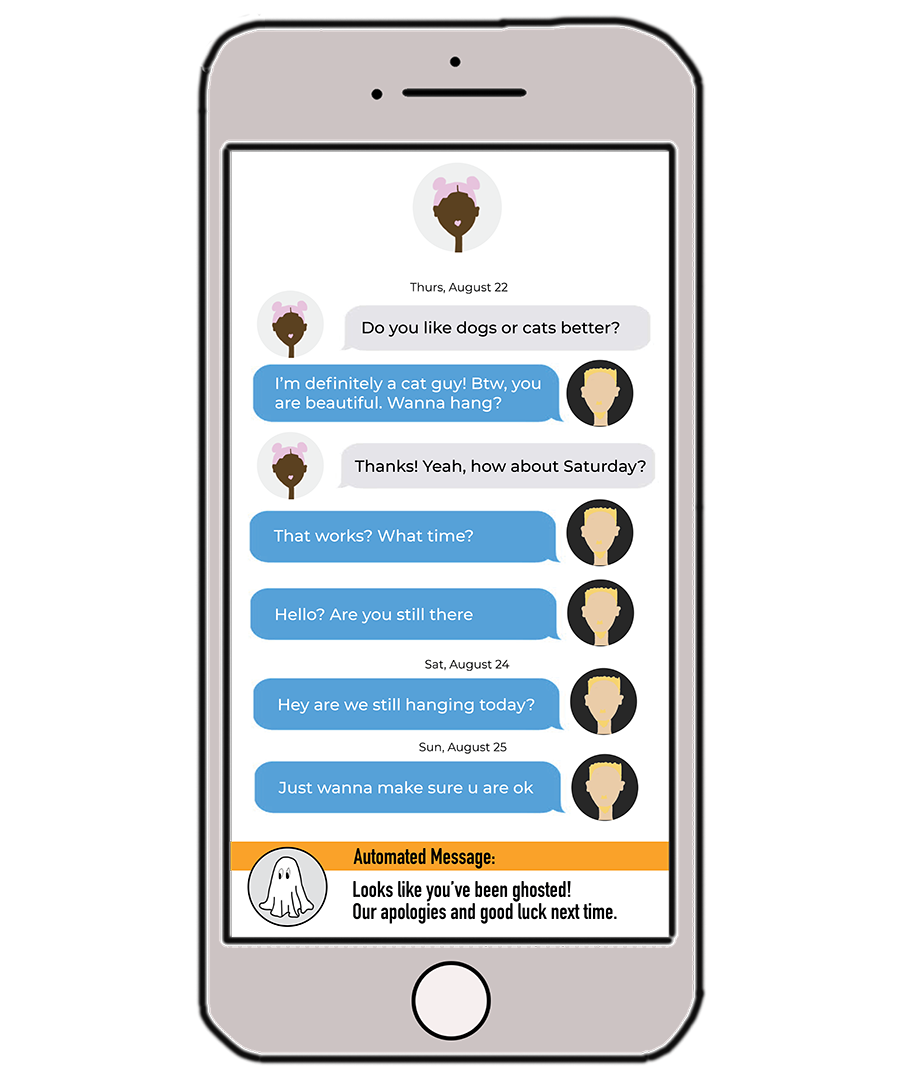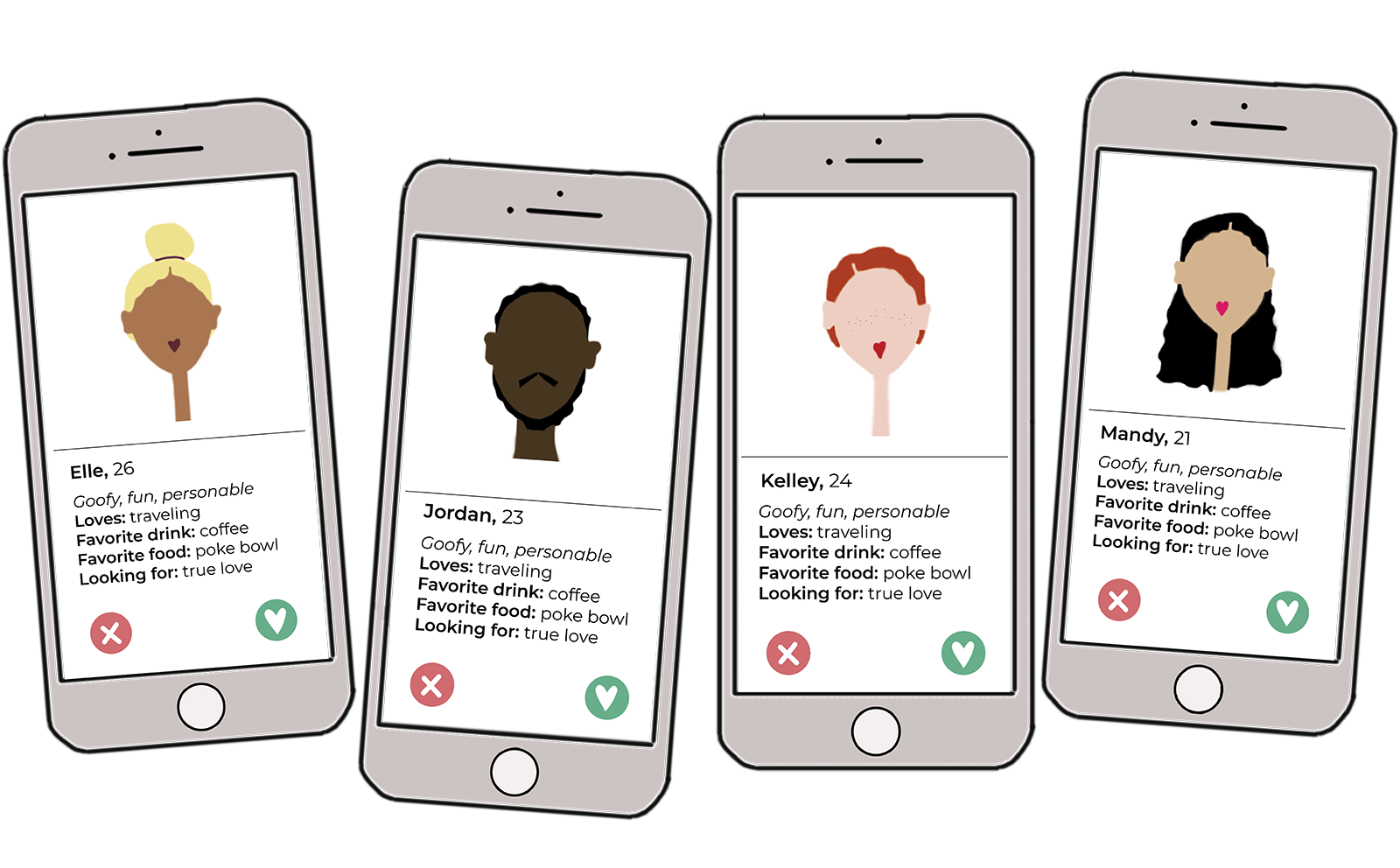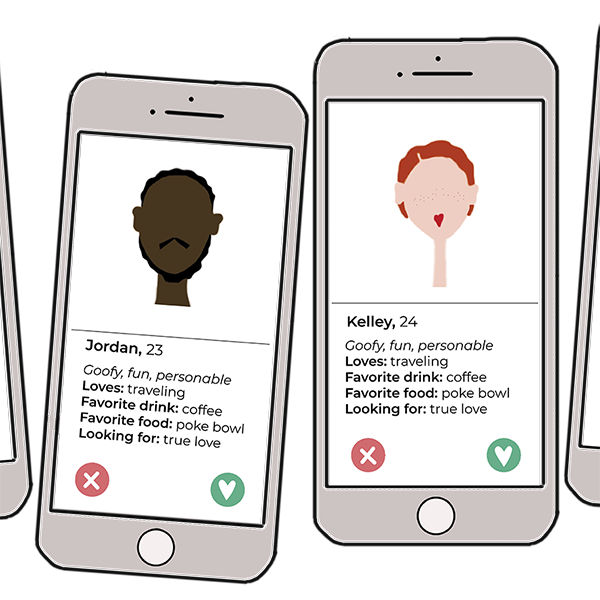Dating apps produce great stories (and not the Hallmark Channel kind). Chances are, if you ask a friend about a crazy dating app story, if they don’t have one, they know someone who does. Taken to Walmart to go pet-fish shopping. Dated dad’s friend. Scammed into going to a club with a promoter. Tossed aside for a roommate. Received unwanted and uncalled-for private-parts pics. Signed up for a threesome by accident. Met a person IRL who lacked any physical similarities with the photo presented online. Mistakenly dated a baby daddy. Blocked. Stalked. Ghosted.
Despite negative experiences and notable frustrations, online dating is a multibillion-dollar industry that attracts a significant number of users. About 48% of 18- to 29-year-olds say they have used a dating site or app, according to an October 2019 study by the Pew Center. The study also highlighted a few of the more challenging aspects of online dating: “By a wide margin, Americans who have used a dating site or app in the past year say their recent experience left them feeling more frustrated (45%) than hopeful (28%),” the report stated.
The Pew Study also highlighted the negative experiences young women encounter in greater numbers: “Six in 10 female users ages 18 to 34 say someone on a dating site or app continued to contact them after they said they were not interested, while 57% report that another user has sent them a sexually explicit message or image they didn’t ask for. At the same time, 44% report that someone called them an offense name on a dating site or app, while 19% say they have had someone threaten to physically harm them.”
When you take away the super likes, the paid premiums, and all the glamorous extra features of dating apps, they all boil down to one concept — you put out into the universe the best visual version of yourself for random strangers to either accept or reject you. “It’s very demotivating, and it’s very easy for people in general to take things very personally,” says Amy Nobile, founder of Love, Amy, a dating concierge company based in New York City. But this concept of bitter humiliation and rejection isn’t just in your head. Nor is it new. Just imagine life without heartbreak. Unfortunately, since the first caveman winked at a neighboring cavewoman or caveman, finding love has been a sloppy, messy endeavor.
“By a wide margin, Americans who have used a dating site or app in the past year say their recent experience left them feeling more frustrated than hopeful.”
But online dating apps possess the power to amplify the negative thoughts swirling in your head. A 2016 study co-authored by Trent Petrie, a professor of psychology at the University of North Texas, found that Tinder users had lower self-esteem and more body-image issues than non-users. “[Tinder] increases internalization, body shame, self-monitoring, social comparison, and body dissatisfaction,” Jessica Strubel, Ph.D., who co-authored the study with Petrie, said in an email to The 61% Project. The study did not prove that Tinder, the most popular dating app with an estimated 7.86 million users, causes low self-esteem or that it undermined body image, but suggests users of social media that enlists “evaluative” behaviors are at risk for these issues. And those “evaluative” behaviors (a user looks at a profile and then evaluates the person by swiping either interested or disinterested) serve as a feature of digital dating that love warriors from previous generations avoided. Only a mere decade ago, people talked on phone and chatted during in-person dates more than they communicated via instant messaging, texting, and direct messages. That constant and immediate communication allows people the ability to detect instantly when interest fades. “It’s so obvious that you’re getting ghosted, and I think that has had a huge impact on people’s well-being, definitely,” says Christine Hohlbaum, researcher and author of The Power of Slow, which offers advice on how to improve the quality of life in an over-scheduled, gadget-reliant existence.
The evolution of dating apps also demonstrates a shift to the immediate and the visual/visceral, which also has emotional and mental repercussions. Twenty-five years ago, when looking-for-love singletons joined Match.com, they filled out extensive profiles, answered questions about their interests and intentions, and wrote essays that highlighted their personality and interests. Tinder delivered a swift, visual alternative perfect for a Twitterverse world accustomed to speedy, hot takes. “Tinder was all about feelings and emotions in a brain-dead caveman, simple, emotional raw way,” says Mark Brooks, CEO of Courtland Brooks, a dating-app marketing company based in New York City, “It was fun for the first time.”
But that fun failed to resolve (and perhaps amplified) the sense of isolation younger generations were beginning to feel thanks to social media. In fact, those in Generation Z and the Millennial Generation are the two loneliest generations in the U.S., according to a 2019 nationwide study with 20,000 adult participants. Current research may not directly connect dating apps to loneliness, but studies do connect social media and our reliance on technology to that loneliness. “It does seem that [social media] plays a role,” says Hohlbaum. “They feel like they’re connected but they really aren’t.” In Cigna’s 2020 U.S. Loneliness Index, which surveyed 10,000 adults, 73% of workers aged 18 to 22 reported sometimes or always feeling alone, which reflected a 69% increase from a year ago. And 71% of heavy social-media users reported feelings of loneliness (up 53%) as compared to 51% of light social-media users. Cigna CEO David Cordani said the index idea began out of a hypothesis that the United States was dealing with a heightened sense of loneliness and disconnection. “We can start to see those disconnections manifest themselves in other health issues,” he explained in an interview with CNBC. “Whether you think about it through the lens of depression, stress or more heavy, complex behavioral issues.”

In fact, those rejection-swipes could do more than bruise an ego. And the reliance on images plays a key role. People associate their first impressions of physical attractiveness with other positive attributes such as intelligence and kindness, according to psychological studies that cite Dataclysm: Who We Are (When We Think No One’s Looking). For college students, 70% reported using at least one dating app. The most popular three dating apps for college students are Tinder, Bumble, and Hinge, per a survey conducted by The 61% Project. And it’s no secret these apps prioritize photos over the text content. On certain dating apps such as Tinder and Bumble, your profile’s matching success rate stems from the pictures you choose. Sure, there’s a few words or phrases in the bio like “here for a good time, not a long time,” but rarely will a user “like” someone without placing some kind of value on their appearance. With such deep associations, it feels almost impossible not to take rejection and ghosting on dating apps to heart. “Tinder is not known for great depth, you go on and look at the photograph and you swipe,” says Brooks. After swiping right and hearting hundreds of profiles and getting unreciprocated results piles into a nasty mess of rejection. “Dating is a rollercoaster ride no matter what we do, and when you’re online dating, it can be especially distressing, because you are putting yourself out there, and it just feels like a string of rejections. It just does,” says Nobile.
Dating apps possess an inherent duality. They feel like the most personal and vulnerable form of social media. But the cold, hard numbers — not personality — fuel this experience. “It’s a game of numbers, and the numbers are working against you in general,” says Brooks. Nobile agrees, saying, “Chemistry-wise, you’re not going to have chemistry with 14 out of 15 people, so you’ve got to up your numbers.” And gender seems to play a role in the numbers game. On dating apps such as Tinder, women tend to “like” people more selectively than men. Because men generally “like” more people than women, they match with a much smaller number of people compared to women. In one study, researchers created different Tinder profiles to determine which gender attracted more digital attention. Among other conclusions, the study found that 59% of women estimated they like 10% or fewer of all profiles, and only 9% of men owned up to that degree of selectivity. Because of that, male profiles earned a match rate of 0.6% compared to their female counterparts, whose matching rate was more than 17 times that of men. “I think that speaks a lot to the male psyche of being the one to take charge, and because dating apps make it a level playing field for women and for men, men are not accustomed to that, and it’s going against their instincts, because they’re the ones that are getting hunted now and it feels very strange when women reject them and then they aren’t hunted,” says Hohlbaum.
“Dating is a rollercoaster ride no matter what we do, and when you’re online dating, it can be especially distressing, because you are putting yourself out there, and it just feels like a string of rejections.”
After the “match” comes the messaging, texting, Snapchatting, and, perhaps, meeting up IRL. Hopefully, a dating app experience ends in a casual meetup. But when you have no idea if the person behind the screen is who they say they are, the goal of a face-to-face encounter becomes a challenge of its own. In the same study above, 73% of respondents said that 10% or fewer of their matches resulted in a real-life meetup. Another study points out that unlike other social media apps, dating apps “bring together strangers who have no prior relationship with one another.” Their research found that most dating app users were worried about their privacy and security when it came to meeting online strangers. They found people mainly feared identity theft, cyber stalking, and sexual predators, among others.
Online dating apps have their negatives, but if used right, they have the potential to lead to happiness. “The real value of internet dating is not so much helping you find the right one, it’s helping you not fall in love with the wrong one,” Brooks says. For Nobile, digital-dating success begins with some self-reflection. Her most important rule for her clients is this: “You can only date someone as deeply as you’ve met yourself.” Before she takes on a client, she asks them about their happiness, their well-being, and how they take care of themselves. “When you feel like, ‘alright I’ve got everything else in order, I just have one missing link,’ then you’re ready,” she says.


